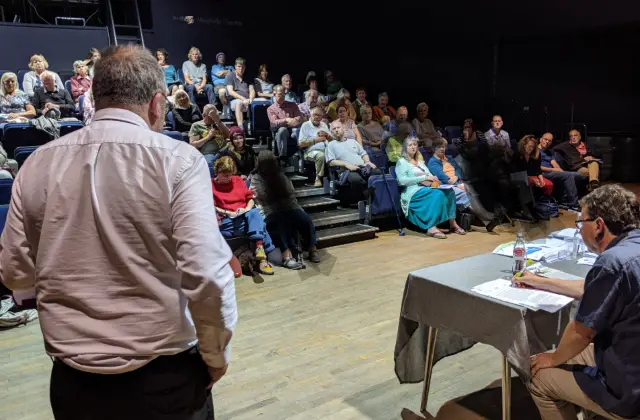Colleen Brannon shares this report from Thursday’s Mental Health meeting and response to IWC’s justification issued following the meeting. Ed
Hang on a minute, Isle of Wight Council. We read your response to over 5,500 Islanders who are imploring you to reconsider plans to close mental health day centres across the Island following the public meeting to discuss the proposals, and found little comfort.
You keep doing that thing some politicians do so well, saying lots without really saying much at all.
Doesn’t feel like you’re being entirely honest
Cards on the table, it doesn’t feel like you’re being entirely honest with us and some of the things you allude to are increasingly concerning. We have some questions.
- We noticed in your response; you say:
“Before any changes in provision are made, every person attending the current services is being reviewed so we can be clear we are continuing to meet all eligible needs and, where we do not have a statutory duty, that we are actively supporting those people to access alternative support”
- What constitutes ‘eligible’? You mention your statutory duties – are we to take this to mean that some people currently receiving help from the centres will receive no help at all, should they close?
- Safety net
We would question the figure you cite, 85 people ‘attending’ these day centres across the entire Island. Attending since when? How many people have ‘attended’ in the last couple of years? Of these, how many have moved on completely (to the credit of the staff at the centres, and a testament their effectiveness), and how many still find the safety net these centres provide, particularly the drop-in aspect, helpful to their recovery, even if they only attend very occasionally? We suspect these centres benefit far more than the 85 people you have cited. - High suicide rates
How can it be credible that, in an area that has a population of over 140,000, where suicide rates are higher than they are nationally (13.3 suicides registered per 100,000 people on the Island vs 10.1 per 100,000 nationally), only 85 people need and benefit from MH drop-in centres? It just doesn’t add up. Far more likely there are many people who would benefit from a well implemented, well-resourced drop-in centre, but are not aware that it exists. - Immediately accessible?
Your ‘community-based, outreach model of support’ – will there be an element to this that is informal, local, immediately accessible, able to adjust to varying needs and offers a safe space to make friends and build a supportive network? If there isn’t, then we will have lost an incredibly valuable resource that protects individuals, families and communities from catastrophe, and save us all money in the long run, if your plans to close the centres go ahead.
It’s not just enough to have the centres. People need to know about them; people in need of the service and practitioners alike.
Well resourced, well-staffed, well supported centres needed
It’s not just enough to have the centres, or to tell people about them – they need to be well resourced, well-staffed, well supported, well integrated with other services.
There is room for improvement – there always is, but there’s no denying the work those centres do is, for some, lifesaving. The people that use and work at the day centres recognise the need for some improvements, saying at the public meeting on Thursday:
“We’ve never said the centres don’t need improvement or transformation, but as part of that we must have drop-in centres that people can get to!”
Essential component of comprehensive service
The staff group, supported by their trade union UNISON, have always been (and remain) very keen to be fully involved in all discussions regarding the development of the service in imaginative and progressive directions – but they themselves see the retention of Day Service provision as an essential component of any improved, more comprehensive service.
The fourth emergency service
The testimony of those service users who spoke during the public meeting on Thursday leave us in no doubt that mental health services like these can be thought of as the fourth emergency service.
Many people spoke of the value of and need for these services. One woman, a single parent, sent a statement to say that these services had saved her life, being one of very few that she had been able to attend with her baby when she needed to.
Healthcare staff unaware of day centres
Someone spoke who had lost a child to suicide, as did a support worker who had lost two people to suicide in the last year, and a man who had been saved from suicide by the day centres – which, by the by, he only learned of by accident, despite being a diagnosed schizophrenic. He said:
“We’ve got to have a system that provides care where it’s needed… and we have that in the day centres. What we don’t have is a coordinated system whereby healthcare professionals know they can refer people to the day centres.
“I had a community nurse last year when I was in crisis, who was not aware of the day centres. I found them, quite by chance, and told her about them, and I got referred. I didn’t realise how ill I was at the time, but I was at the point of suicide.”
Not properly consulted
We believe the public has not been properly consulted on the plans to close the centres – until very recently, closure was not mentioned, rather ‘reconfiguration’ (what does ‘reconfiguration’ really mean, anyway?).
The centres would have been closed by now if the original plans had gone ahead. Maybe you were hoping people wouldn’t notice, or worse, wouldn’t care.
Over 5,500 people saying it loud
But over 5,500 people are telling you, loud and clear, we do care, we do not accept these cuts to vital services for the most vulnerable.
A room full of people gave up their free time on Thursday night to talk about these centres, and it was overwhelmingly clear that people consider the drop-in aspect of this service essential.
Surely, we can’t be expected to believe (again) that cutting a service improves a service? Surely too, this can’t just be about making a £140,000 (short term) saving? Are there any plans for what will happen to the land the centres sit on?
No more passing the buck
We’re so very sick and tired of hearing people pass the buck. The government pass the buck on to councils, along with extra responsibilities, and say it’s councils making the cuts.
Councils, rightly, say they have to make ‘tough decisions’ because of national government and their ideological austerity (hey! Wasn’t that supposed to be over?) …but the bottom line is that the books are always balanced on the backs of our most vulnerable friends, family and neighbours. Things can’t go on like this. ow
The Mental Health Blueprint outlines the plan intended to make our CQC-rated inadequate mental health care services safe. We have a suicide prevention strategy that is unfit for purpose according to Cllr Lilley, not least because there is no funding to implement the recommendations it makes.
Credibility of commitment challenged
The Blueprint says you will listen to service users and the community, the Mental Health Challenge commitment you made says the same, yet it was mentioned at the public meeting that Cllr Mosdell, (Cabinet Member for Adult Social Care and our appointed Mental Health Champion) and Dr Tozer have visited one of the centres only once, and very recently, in the last two years.
We must question the credibility of your commitment not only in the Local Authority Mental Health Challenge pledge, but also to the Island’s Mental Health Blueprint, if you fail to listen people who use the service, and the community.
Will you hear 5,500 of us?





